By Lauren Stinson
Finally, I have a voice. Within Western culture and media, disability is rarely ever represented, be it through books, television, films, video games or music. Speechless brings the disability to public television. Disability itself is under-publicized and is often ignored by mainstream media, even though the disabled minority group is the largest minority group in the world. The show Speechless was picked up by ABC and airs on Wednesdays nights on cable television.
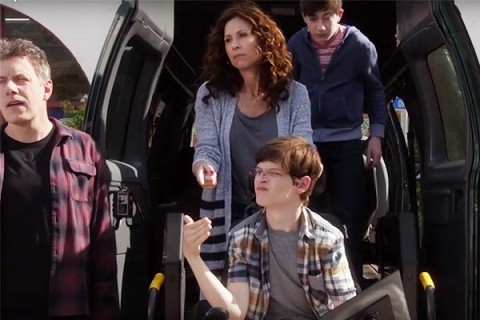
Not only does Speechless showcase disability, it places cerebral palsy in the spotlight. Growing up as someone with cerebral palsy, I was overjoyed to see any character with a physical disability on my television screen. Any crumbs of representation that I could relate to I would happily eat up as a child because there was so little of it. Beggars can’t be choosers as they say. Now there is a family friendly cable television show picked up by a major network where the main character has cerebral palsy! Better yet, the young actor, Micah Fowler, who plays J.J. DiMeo has cerebral palsy in real life! It almost sounds too good to be true. Someone pinch me!
The importance of representation for youth with cerebral palsy
Speechless is not the first show to have an actor with cerebral palsy cast in it. Breaking Bad paved the way for actors with cerebral palsy to represent themselves on screen with R.J. Mitte portraying Walter White in the hit series. I have little doubt that the success of Breaking Bad helped create a space for Speechless in the television landscape. A new landscape where the networks and producers could see a disability-centric show succeeding.
In regards to representation, the most important difference between Speechless and Breaking Bad is that Speechless is a family friendly show. Children can watch Speechless and see disability and cerebral palsy being represented on their television screens. This is so important! As a child growing up with cerebral palsy, I was often the only kid with the disability, in school programs or in my whole elementary and high school. This created feelings of isolation and being alone. Speechless has the ability to show disabled children that they are not alone. That their experiences as disabled youth are validated and normal. It would have meant the world to me to have a show like Speechless growing up. I am beyond grateful, and a tiny bit jealous that the cerebral palsy children of today have Speechless as a form of representation and as well as a resource.
The creator of Speechless, Scott Silveri, based the show off his real-life experience growing up with a brother with special needs. This, paired with the fact Micah Fowler, the actor of J.J. DiMeo, has cerebral palsy, gives the show authenticity. This is not a symbolic or pandering portrayal of disability constructed to appease an able-bodied audience. Instead Speechless is crafted to give a real genuine portrayal of cerebral palsy. The show’s authenticity is then stretched to create comedy.
Using comedy to explore the taboo of disability
Speechless falls within the genre of comedy. Comedy has the uncanny ability to keep a subject matter light. Yet by the same token, comedy can approach and explore sensitive or even taboo issues. Speechless uses comedy as a vessel to explore complex issues that affect the disabled community, yet at the same time keeps the subject matter accessible, (disabled pun intended), and enjoyable to a mass audience. Subconsciously the show is educating people on the disabled experience while simultaneously being entertaining which is really a wondrous prospect.
Through the use of comedy, the show shines a lens on the disabled experience. Take J.J. DiMeo’s mother for instance, Maya (Minnie Driver). The humour is created through her exaggerated portrayal of an over-the-top, almost eccentric, disability activist. Maya would do anything to make sure her son gets treated with respect he deserves and won’t stop at anything until his accessibility needs are met. Yes, it is the extreme exaggeration of her activism that is humorous. Yet, on a personal level the character is still relatable. My own mother fought tooth and nail to make sure I had the best life possible. She fought to place an accessible bus stop by my house and made sure an elevator was put in the high school I was going too, just to name a few. My mother was also my warrior. Maya is comical, yet the humour stems from an attainable place, a place of truth and reality. But in a way I also find this worrisome. It brings to the forefront the actuality that disabled children need an over-eccentric parent to be heard and to be seen. That the world is innately structured for the able-bodied and if you deviate from the societal “norm” you have to fight for your basic rights as a human being. Whether it’s your right to enter a building, use the washroom or to take part in the classroom. J.J.’s mother is just one example of the disabled experience Speechless explores. Others include sibling dynamics, support staff, accessibly of buildings (and usage of garage ramps as the accessible entrance), dating, disability perks, and able-bodied preconceived notions of the disabled community.
Speechless gives a voice to the disability community, and in particular to children with cerebral palsy. The show helps make disability universal in television and brings the social and cultural struggles of the disabled community to the forefront, yet the show is still comically accessible to a mass audience. Please go and watch Speechless on ABC. Put it on your DVRs tonight!
Lauren is a co-facilitator of the Youth Without Limits Support Group.
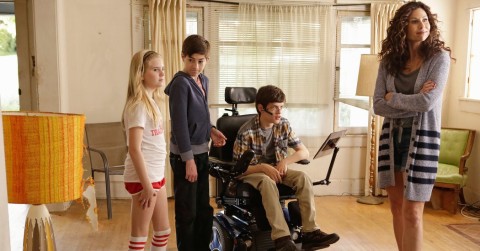
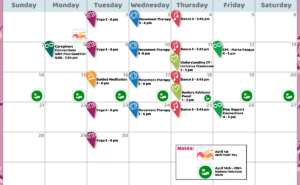 Programs Calendar
Programs Calendar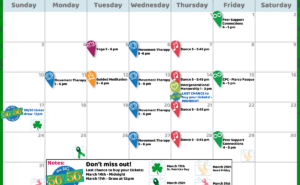 Programs Calendar
Programs Calendar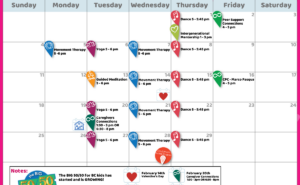 Programs Calendar
Programs Calendar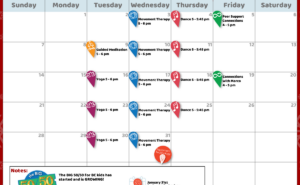 Programs Calendar
Programs Calendar

